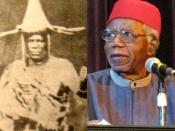The inner journey is one which involves the hurdling of psychological barriers, as well as cultural and social obstacles, rather than just a physical trek. The novel Things Fall Apart (1958) by Chinua Achebe and the film Whale Rider (2002) by Niki Caro both address the overcoming of emotional boundaries, while following the progress of the main characters. Issues such as cultural differences and gender equality are presented by the composers through the clever use of devices appropriate to the medium, while using the post-colonial context to accentuate these issues.
Things Fall Apart by Chinua Achebe is a novel which follows the journey of a Nigerian warrior, Okonkwo, who reaches the height of power in his village. Achebe uses the colonisation of Nigeria as the setting for his novel, which acts as a catalyst for change in the Ibo tribe, positioning the reader to criticise the Europeans' interference: "An abominable religion has settled among you".
The European culture is one of the challenges which Okonkwo faces in his inner journey. Following his exile, Okonkwo witnesses his culture fall apart, an example being the massacring of the Abame tribe. Achebe's use of a proverb highlights the diversity of cultures and the logical inevitability of changing values, "The world has no endâ¦What is good among one people is an abomination with others".
During Okonkwo's exile, the reader is positioned to view Okonkwo with pity, as he is forced to restart his life. This struggle is presented through strong imagery and personification when Achebe describes the elements to show how powerless he is: "The sun had been gathering strength till it seemed to breathe a breath of fire". Furthermore, the line, "Clearly his personal god or chi was not made for great things", foreshadows the dark events to come, while positioning us to...


